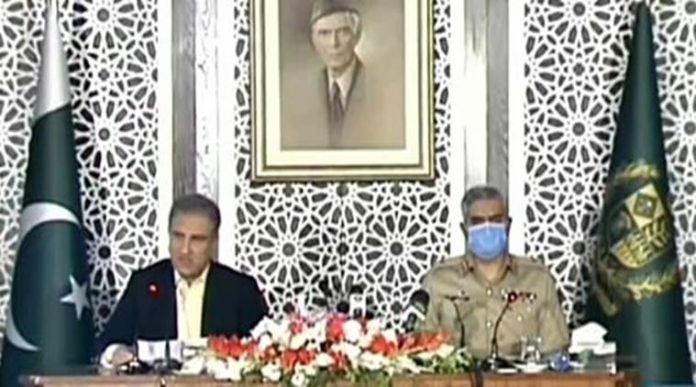COLUMN
“Yeh jo dehshatgardi hai, iske peeche vardi hai (Pakistan military is behind terrorism in Pakistan).” One often gets to hear these chants at public rallies and elsewhere in Pakistan, highlighting the fact that the all-powerful military indulges in state terrorism in the country and coerces the civilian authority into subjugation.
It is no secret that Pakistan Army has never allowed any civilian government in the country to function properly and leaders who dared to disobey the military dictates have been dethroned, either through coup or by slapping false cases against them. Pakistan has a sad history of no elected government being allowed by the military to complete its full five-year term.
It is also no secret that Pakistan’s notorious intelligence agency – Inter-Services Intelligence (ISI) – is used by the Army as a tool to create an atmosphere of fear within the country through targeted killings and ‘enforced disappearances’.
These facts may have been understated all these decades but lately Pakistan has been witnessing a popular uprising of sorts against the Army, under the garb of unhappiness against its proxy – the ‘selected’ government of Imran Khan.
Voices of protest against the Pakistan Army are amplifying rapidly and across the country, indicating that the people want to break the shackles of the military. Such is the state of affairs in Pakistan that even renowned journalists like Matiullah Jan are abducted in broad daylight in the heart of Pakistan’s capital Islamabad by the ISI men for speaking against the Army.
It was Matiullah Jan’s sheer good luck that his abduction was caught on camera, placed at the gate of a nearby school, and there was immediate uproar, forcing the ‘deep state’ to release him by the night of the same day – July 21. Otherwise, Jan would have joined many, like journalist Tanveer Ahmed of Pakistan-occupied Kashmir who remains missing after being abducted on August 21, or others who return only in the form of dead bodies.
After his release, Matiullah Jan issued a video statement, in which he openly said that his abduction was carried out by the ‘state agencies’ and that they have caused huge destruction of Pakistan.
Fed up with the military’s machinations, 11 opposition parties of Pakistan have come together under the banner of Pakistan Democratic Movement (PDM), with an aim of establishing the “real democracy” in the country, where the Army will have no role in politics.
Over the last month, the PDM has organised massive rallies at various places across Pakistan. Patronised by former three-time Prime Minister Nawaz Sharif, the PDM is being steered on the ground by his daughter Maryam Nawaz along with Pakistan People’s Party (PPP) leader Bilawal Bhutto, son of late Prime Minister Benazir Bhutto.
Significantly, Sharif’s Pakistan Muslim League-Nawaz (PML-N) and PPP have been arch political rivals who have joined hands with an aim of ousting the “selected” Imran Khan government.
The PDM rallies in Gujranwala (in Punjab Province on October 16), Karachi (in Sindh Province on October 18) and Quetta (in restive Balochistan Province on October 25) saw huge public turnout and unprecedented direct attack on the omnipotent Army Chief Gen Qamar Bajwa and his clan for unleashing state terrorism on the people of the country and suppressing civil institutions.
There was an attempt to scuttle the rally in Quetta with a bomb explosion being carried out, suspectedly by the ‘agencies’. But the PDM was not dissuaded and rally was organised, during which Army came under attack for ‘enforce disappearances’ and other illegal activities.
Sharif, who addressed these rallies from London via video conference, directly named Gen Bajwa for toppling his duly-elected government by foisting false corruption charges to install a ‘selected’ government of Imran Khan in 2018.
The PDM, which continues to gain popular support reflecting resentment against the Army in an unprecedented manner, has vowed to step up the momentum to establish the civilian supremacy in the country. More rallies are lined up in the near future — Peshawar on November 22, Multan on November 30, Lahore on December 13 and Larkana on December 27, the final one this year.
If the PDM was not enough, Pashtus or Pathans have also ventured onto a mass movement against “state terrorism” in Khyber Pakhtunkhwa Province.
The Pashtun Tahaffuz Movement (PTM) has been undertaking a campaign under the banner of ‘Pashtun Long March’ against atrocities being committed the Army and intelligence agencies, like targeted killings and enforced disappearances.
These developments have clearly unnerved the Pakistan Army, which is the real force behind the Imran Khan government, and hence it played its much-used ‘India card’. This is the backdrop against which the Imran Khan government, at the behest of Army, came out with absurd allegations against India that it is “fanning terrorism” in that country.
The ‘India phobia’ card has been played as a desperate attempt to ease the mounting pressure on the Imran Khan government and through it, on the Army.
The attempt clearly is to fuel nationalistic jingoism in Pakistan and divert attention of the people from the resentment against the Army and its misdeeds, reflected in the growing civil movement.
Khan and his ministers have already tried to defame the PDM by labelling them as “Indian agents”. The ministers have also issued veiled threats to them by saying “political leaders could be assassinated”.
The Imran Khan government claims the assassinations could be engineered by India. This claim serves two purposes for the Pakistan Army and its proxy government – eliminate opposition leaders raising voice against the military and put the blame on India, to turn the tide in its favour.
Interestingly, Pakistan Foreign Minister Shah Mehmood Qureshi levelled the allegations against India while sharing the podium with Director General of Inter-Services Public Relations (ISPR), who is the military spokesperson. That in itself speaks volumes about the state of affairs in Pakistan. Can anyone imagine a military spokesman sharing podium with the Foreign Minister at an official press briefing in any democratic country?
So, while Qureshi said he wanted to “show the real face of India to the world”, he himself could not hide “the real face of Pakistan” where a Foreign Minister can’t even address a press conference without direct supervision of the military.
A glaring example of how the military in Pakistan has converted all civilian institutions of the country into a joke was the abduction of a police officer of the rank of IGP of Karachi on October 18 by the armed forces personnel and coercing him to sign arrest warrant against son-in-law of Nawaz Sharif. This led to a revolt by the Sindh police whose entire brass opted to go on long leave in protest against the “humiliation” meted out to the force by the Pakistani military.
Although Gen Bajwa ensured that the protest was withdrawn by his assurance of a “fair” probe, the discontent persists within the civilian institutions across the country.
Anurag Srivastava, Spokesperson of Indian External Affairs Ministry, aptly described the allegations by Qureshi as a “deliberate attempt on the part of the Pakistani establishment to shift focus from its internal political and economic failures”.
Describing the press conference by the Pakistani establishment as “yet another futile anti-India propaganda exercise”, he said, “The so-called claims of ‘proof’ against India enjoy no credibility, are fabricated and represent figments of imagination.”
He asserted that “this desperate attempt (of Pakistan) will find few takers as the international community is aware of Pakistan’s tactics and proof of its terror sponsorship has been admitted by none other than its own leadership.”
Srivastava said “concocting documents and peddling false narratives will not absolve Pakistan” which is known as a producer of terrorists, because of whom not only India, but other neighbours are also suffering.
Leaders of Baloch groups, who are fighting for liberation from Pakistani occupation, have also rubbished Pakistan’s claims about receiving support from India.
Terming the allegations as “black propaganda”, they said if the Baloch had “foreign financial aid and military support, the situation would have been different” and cited the example of how Bangladesh was liberated after India provided assistance.
“The Pakistani Foreign Minister and the ISPR are using such tactics to boost the morale of their army and mislead the masses,” tweeted Baloch leader Dr Allah Nizar Baloch.
This observation is absolutely correct. While many people in Pakistan could be fooled by the Army as they have been earlier, the international community will surely offer only rebuff to Pakistan, like it did over its cries and wailing over the abolition of Article 370 in Jammu and Kashmir in August last year.







